Charting the Biblical journey of the oppressed reveals God's stance on injustice, inviting readers to explore deeper into historical and contemporary relevance.
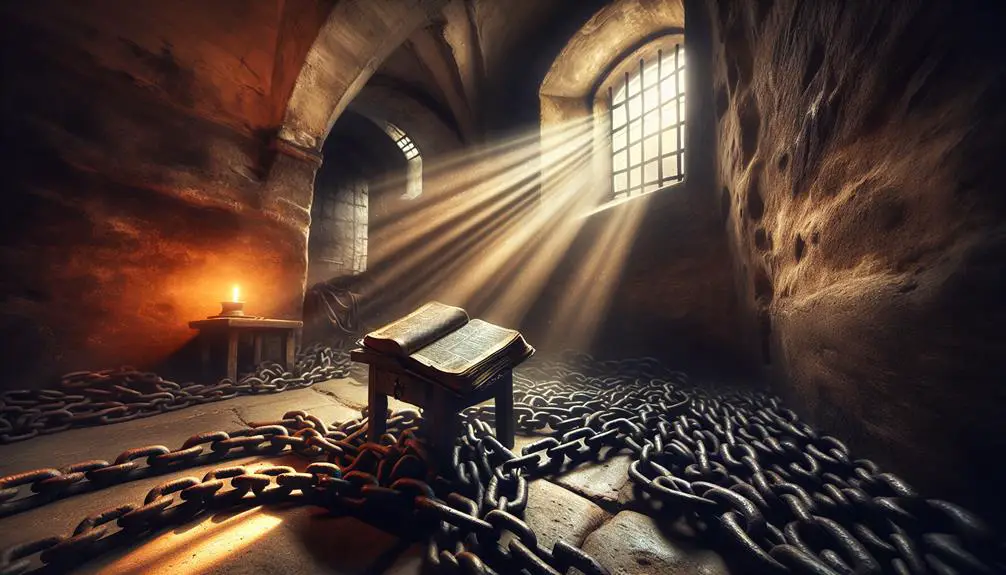
Define Oppressed in the Bible
Imagine walking through ancient lands, witnessing the plight of those burdened under the yoke of oppression, a theme deeply woven into the fabric of the Bible.
You'll find that the concept of oppression in the scriptures is multifaceted, touching on economic, social, and spiritual dimensions.
As you explore the Biblical context of oppression, you'll uncover how it identifies the oppressed, God's vehement response to injustice, and the prophetic calls for social justice.
This journey through the texts not only sheds light on the struggles of the past but also echoes in today's discussions on inequality and advocacy for the marginalized.
Why does this matter in our modern world? Let's begin to unravel this together.
Key Takeaways
- The oppressed in the Bible include the poor, foreigners, widows, and orphans, highlighting a multifaceted nature of marginalization.
- Biblical narratives often showcase systemic injustices, underscoring the role of societal structures in perpetuating oppression.
- Divine response to injustice involves direct intervention, mercy, and retribution against oppressors, illustrating a commitment to justice for the marginalized.
- Advocacy against injustice is a recurring biblical theme, involving miraculous healings, spiritual guidance, and vocal opposition to inequality.
Biblical Context of Oppression
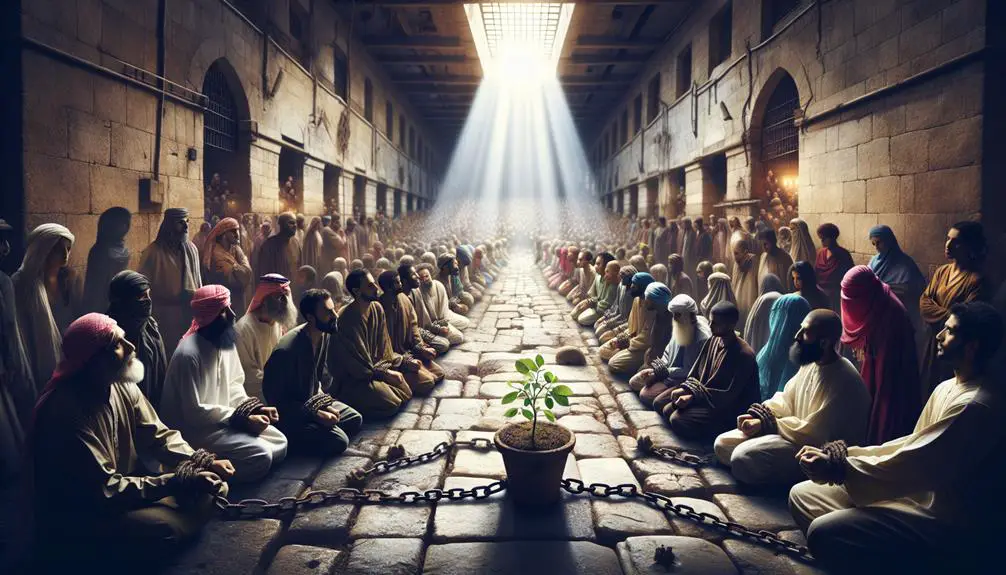
Throughout the Bible, oppression emerges as a recurrent theme, reflecting the struggles and injustices faced by various groups across different historical contexts. In examining the biblical context of oppression, it's crucial to understand the role of historical oppression and how it intertwines with the cultural context of the times. The Bible doesn't merely recount tales of individual suffering; it embeds these narratives within broader socio-political frameworks, offering insights into the systemic injustices that prevailed.
Historical oppression in the Bible often mirrors the power dynamics and societal norms of ancient civilizations. For instance, the enslavement of the Israelites in Egypt isn't just an isolated event but a reflection of the era's acceptance of slavery as an economic system. Similarly, the prophets' denunciations of injustice towards the poor and marginalized shed light on the societal structures that perpetuated inequality.
Understanding the cultural context is pivotal in grasping the multifaceted nature of biblical oppression. The texts encapsulate a world where legal, economic, and social systems were deeply intertwined with religious beliefs, amplifying the impact of oppression. In this light, the Bible serves not only as a religious document but also as a historical artifact, offering a window into the complexities of ancient societies and their struggles with injustice.
Identifying the Oppressed
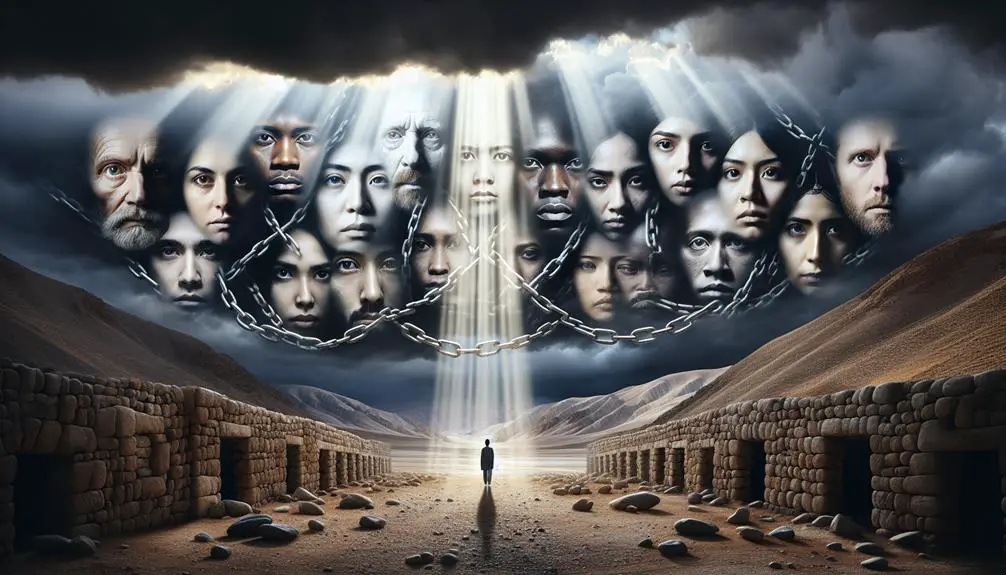
Having explored the broader context of biblical oppression, we now turn our focus to the individuals and groups most affected by these injustices, shedding light on their experiences and struggles. The Bible presents a variety of oppression definitions, each illustrating the depth of suffering encountered by marginalized voices. To understand who the oppressed are, consider the following:
- The Poor and Economically Disadvantaged: Often, scripture highlights the plight of those struggling with poverty. These individuals lack not only material resources but also access to justice and societal influence.
- Foreigners and Sojourners: The Bible frequently mentions the mistreatment of foreigners, who face discrimination and exclusion due to their non-native status. Their vulnerability is emphasized, revealing a systemic issue of neglect and exploitation.
- Widows and Orphans: Symbolizing the most vulnerable in society, widows and orphans embody the quintessence of marginalization. Bereft of their traditional protectors, they face heightened risks of exploitation and neglect.
Analyzing these examples illustrates the multifaceted nature of oppression within biblical texts. It's not just about economic hardship but also about social exclusion and systemic injustices. By identifying the oppressed, we gain a deeper appreciation for the complexities surrounding marginalization and the imperative to listen to these often-silenced voices.
God's Response to Injustice
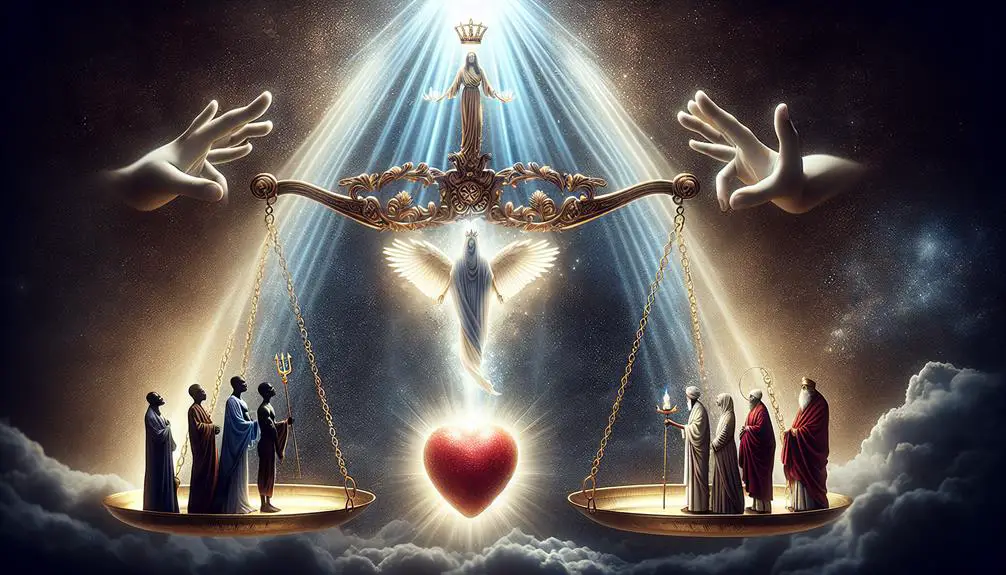
You'll find that the Bible presents a multifaceted view of God's response to injustice, emphasizing His justice for the oppressed, divine intervention, and mercy.
These themes demonstrate how divine action intersects with human affairs, particularly in situations of oppression.
God's responses, as depicted in scripture, provide a framework for understanding His character and the principles of divine justice and mercy.
God's Justice for Oppressed
In examining the biblical response to injustice, it's evident that God's justice for the oppressed emerges as a fundamental theme, reflecting a divine commitment to righteousness and equity. This commitment is illustrated through:
- Divine retribution against oppressors, showcasing a moral universe where actions have consequences.
- The principles of Liberation theology, emphasizing God's preferential option for the poor and His active role in their liberation.
- Prophetic messages that call for social justice, equity, and the protection of the vulnerable.
Through these mechanisms, the Bible conveys a clear message: God actively opposes injustice and champions the cause of the oppressed. This theological stance isn't passive but involves divine action that aligns with principles of justice and liberation, highlighting the intrinsic value God places on human dignity and equality.
Divine Intervention and Mercy
Throughout history, countless narratives within the Bible illustrate how divine intervention and mercy play crucial roles in God's response to injustice, offering both immediate relief and long-term redemption for the oppressed.
Intervention Strategies |
Mercy Techniques |
|---|---|
Direct communication |
Forgiveness |
Miraculous provision |
Compassion |
Empowerment of leaders |
Healing |
These strategies and techniques aren't just isolated instances but form a pattern of divine engagement with humanity. Direct communication often comes through prophets or angels, providing guidance and reassurance to those suffering. Miraculous provisions, such as manna from heaven, address immediate physical needs, while the empowerment of leaders like Moses facilitates the deliverance of entire communities. Simultaneously, mercy is manifested through forgiveness of sins, compassion towards the downtrodden, and healing both physical and emotional wounds, underscoring God's deep concern for justice tempered with love.
Righteous Judgment of Injustice
God's response to injustice also encompasses righteous judgment, where He assesses situations with fairness and acts decisively to rectify wrongs. This divine intervention often leads to:
- Legal reforms that address and correct the systemic issues within governance and law enforcement, ensuring that justice is accessible to all, irrespective of social standing.
- Challenging societal biases, by highlighting and condemning unfair treatment and discrimination, thereby fostering a more equitable society.
- Empowering the oppressed, giving voice and agency to those who've been marginalized, ensuring their grievances are heard and acted upon.
This approach underscores a commitment to justice that transcends human limitations, confronting and dismantling the structures that perpetuate inequality. By emphasizing legal reforms and challenging societal biases, God's righteous judgment serves as a powerful catalyst for meaningful change.
Prophets and Social Justice
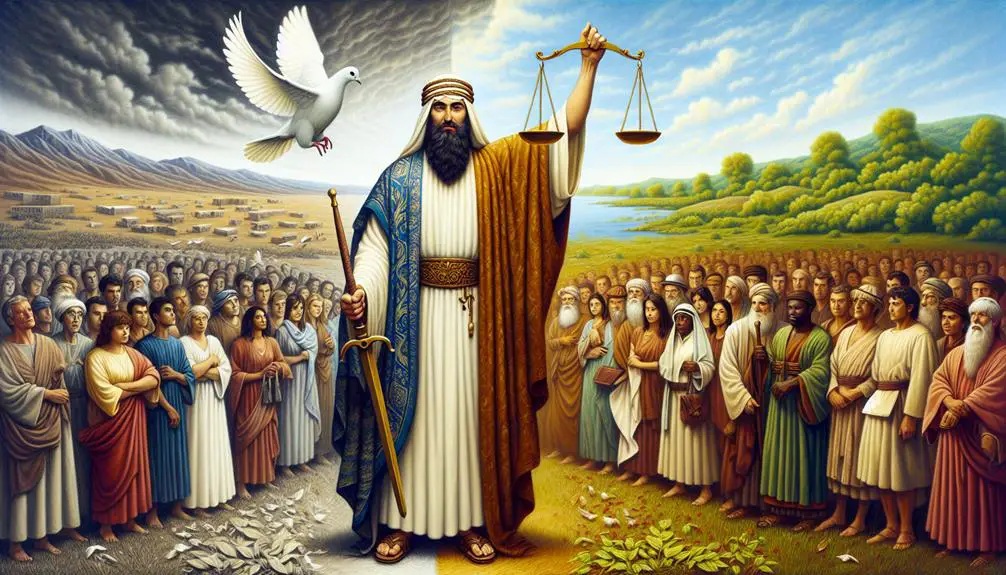
You'll find that prophets played a crucial role in advocating for justice and addressing inequalities within the biblical narrative. They not only challenged the status quo but also actively spoke out on behalf of the marginalized, embodying God's concern for social justice.
This discussion will explore how their actions and teachings provide a foundational understanding of biblical justice and its implications for addressing inequality today.
Prophets' Role in Justice
In the realm of biblical narratives, prophets play a pivotal role in advocating for social justice, serving as divine messengers who challenge oppression and call for ethical governance. Their missions encompassed:
- Miraculous healings, demonstrating compassion towards the marginalized and showcasing divine power to instill hope.
- Spiritual guidance, steering societies towards righteousness and away from corrupt practices.
- Vocal opposition to injustice, fearlessly condemning the exploitation of the vulnerable by the powerful.
Through these actions, prophets not only addressed immediate injustices but also laid the groundwork for a more equitable society. Their legacy is a testament to the enduring importance of advocating for the oppressed and striving for a world that reflects divine principles of justice and compassion.
Addressing Inequality Biblically
Building on the foundation laid by prophets' advocacy for social justice, this section explores how biblical narratives address inequality through divine directives and human action. These narratives often highlight the consequences of ignoring economic disparity and cultural biases, urging both leaders and communities to act justly.
Biblical Concept |
Impact on Inequality |
|---|---|
Jubilee laws |
Redistribution of wealth, mitigating economic disparity |
Prophetic admonitions |
Condemnation of unjust practices, highlighting cultural biases |
Parable of the Good Samaritan |
Advocacy for cross-cultural compassion and action |
Equality in Creation |
Reinforcement of intrinsic value, challenging societal norms |
This table synthesizes key biblical principles that confront inequality. It's clear that the scriptures advocate for a proactive stance against injustice, addressing both economic disparity and cultural biases through divine wisdom and human responsibility.
Advocating for the Marginalized
Throughout biblical history, prophets have played a pivotal role in advocating for the marginalized, challenging societal norms, and urging communities to embrace social justice. This advocacy is deeply rooted in principles of social empowerment and cultural humility, reflecting a profound commitment to ensuring justice and equality for all.
To create imagery in your mind, consider the following:
- Prophets standing boldly before kings, unafraid to voice the divine mandate for justice and equality.
- Communities gathering to listen, their hearts and minds opened to the messages of social empowerment and cultural humility.
- The transformation of societies, as ancient texts reveal the shift towards a more inclusive and just community under the influence of prophetic advocacy.
This narrative underscores the timeless relevance of advocating for the marginalized, emphasizing the critical role of cultural humility and social empowerment in fostering societal change.
Jesus and the Marginalized
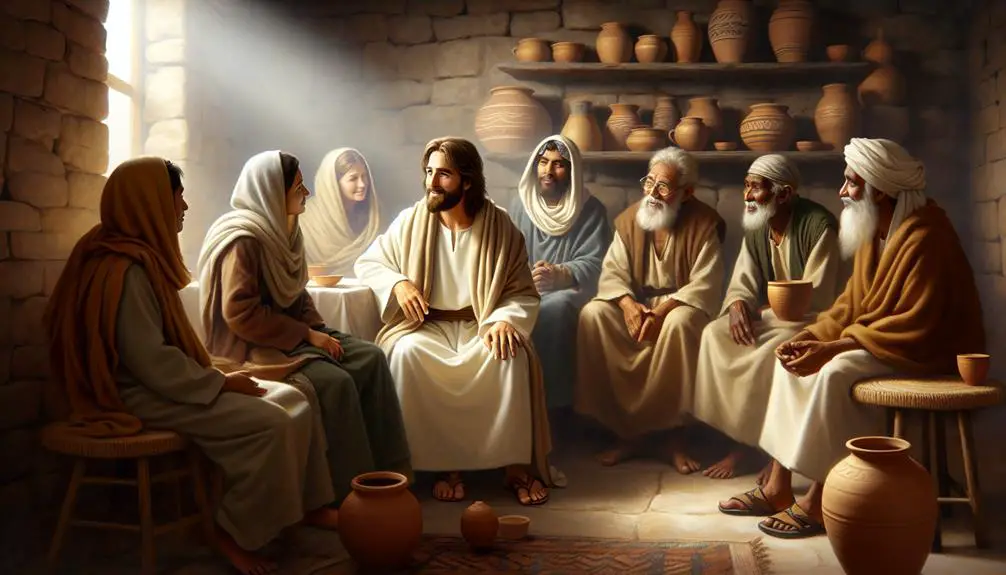
Jesus' ministry notably centered on reaching out to and uplifting those marginalized by society, demonstrating a profound commitment to inclusivity and compassion. This approach is vividly illustrated through miraculous healings and community feasts, which served not only as manifestations of divine power but also as symbolic acts of restoring dignity and belonging.
Miraculous healings, for instance, often involved individuals ostracized due to illness or disability, highlighting Jesus' defiance of social stigmas and his endeavor to reintegrate the marginalized into the community. Similarly, by hosting or participating in community feasts with tax collectors, sinners, and the impoverished, Jesus challenged societal norms that favored exclusion and purity laws, advocating instead for a community based on acceptance and mutual respect.
These acts were radical in their context, representing a tangible break from prevailing attitudes towards the marginalized. They weren't merely charitable deeds but strategic interventions aimed at restructuring societal values around equity and compassion. Through these actions, Jesus modeled a way of life that prioritized the needs of the marginalized, offering them not just physical healing but also social and spiritual inclusion. This aspect of Jesus' ministry underscores a pivotal message of the Bible: the call to embody God's love through justice and mercy towards all, especially the oppressed.
Parables of Liberation

In addition to his direct interactions with the marginalized, Jesus also utilized parables of liberation to further illustrate the kingdom of God's inclusive nature. These stories weren't just moral lessons but deep, theological narratives about economic justice, social inclusion, and spiritual freedom. They served as metaphors for the transformative power of God's love and the call to action for believers to participate in the liberation of the oppressed.
Consider the following parables to grasp the depth of Jesus' message:
- The Parable of the Workers in the Vineyard (Matthew 20:1-16) challenges economic norms and the concept of fairness, emphasizing God's generosity and the idea that the last will be first and the first last.
- The Parable of the Good Samaritan (Luke 10:25-37) breaks down racial and religious barriers, urging listeners to extend compassion beyond societal boundaries.
- The Parable of the Prodigal Son (Luke 15:11-32) showcases spiritual freedom through the lens of forgiveness and reconciliation, highlighting God's endless grace for the lost.
These economic parables and stories of spiritual freedom underscore Jesus' revolutionary message of hope and liberation, inviting you to envision a world where love and justice prevail.
Commands to Defend the Weak
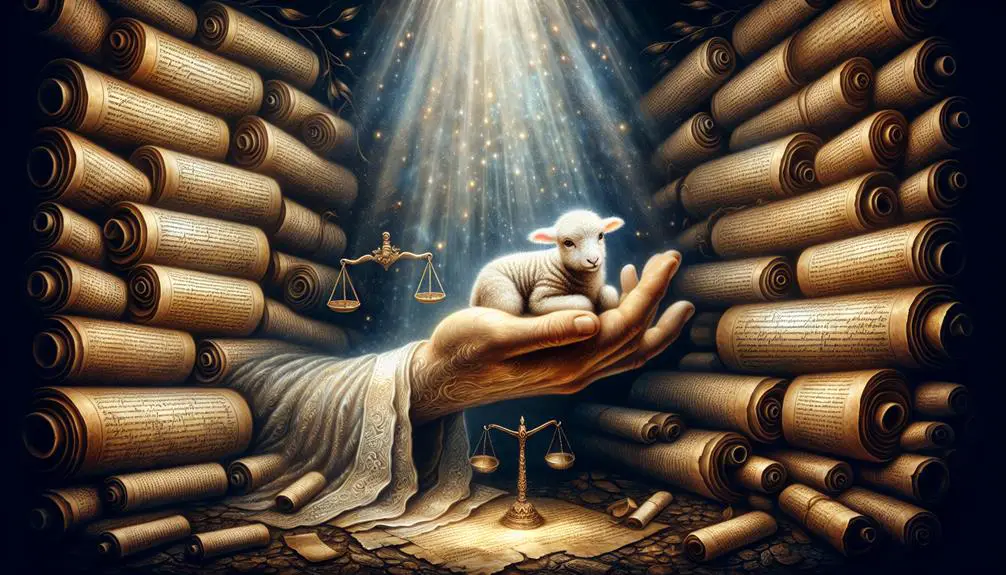
Central to the teachings of the New Testament are explicit commands that urge believers to actively defend the rights of the weak and marginalized. This directive isn't merely a suggestion but is deeply embedded within the framework of Christian ethics, reflecting a profound commitment to social responsibility. The scriptures provide clear charity guidelines, emphasizing the importance of caring for those who are oppressed by societal structures.
Analyzing these biblical mandates, one observes a consistent theme: the call to action is unequivocal. Believers are instructed not to passively witness injustice but to engage in acts of compassion and advocacy. This approach is indicative of a broader theological understanding that views the care of the vulnerable as a manifestation of divine love in the world.
Moreover, the biblical exhortation to defend the weak transcends mere individual acts of kindness. It encompasses a collective responsibility, urging communities of faith to institute practices that support the disenfranchised. This collective action is crucial in addressing systemic issues that contribute to oppression.
In essence, the biblical commands to defend the weak serve as foundational elements for developing a comprehensive approach to social justice. Through this lens, charity is understood not as optional benevolence but as an imperative component of living out one's faith.
Modern Reflections on Biblical Oppression
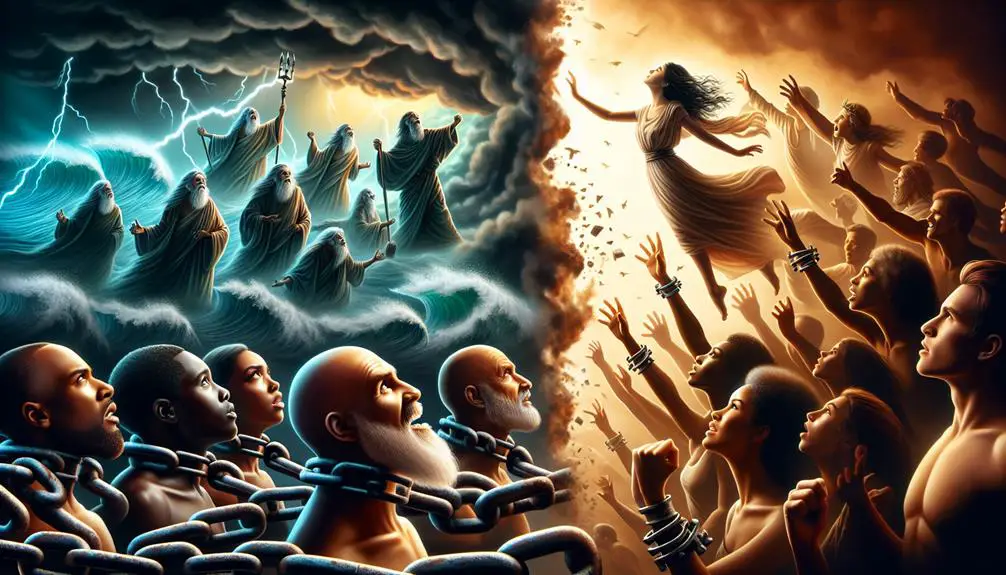
Reflecting on how these biblical mandates to defend the oppressed translate into contemporary contexts reveals a complex interplay between ancient texts and modern social justice efforts. You'll find that the core principles of advocating for the marginalized and challenging structures of power resonate deeply within both realms. The application of these age-old teachings in today's world underscores not only their timeless relevance but also highlights modern parallels and societal impacts that stem from recognizing and addressing oppression in its many forms.
To illustrate the vivid imagery of this translation of biblical principles into modern advocacy, consider the following:
- Social Movements: Grassroots campaigns for civil rights and equality draw directly from the biblical call to uplift the downtrodden, showcasing a direct lineage of moral and ethical activism.
- Legislative Reforms: Efforts to enact laws that protect the vulnerable reflect the biblical imperative to establish justice and equity, highlighting the societal impacts of these ancient commands.
- Community Support Systems: The creation of shelters, food banks, and support networks for those in need mirrors the biblical exhortation to care for the widow, the orphan, and the stranger, demonstrating how these teachings continue to influence modern humanitarian efforts.
Through these examples, it's clear that the biblical injunctions against oppression haven't only endured but have found new expressions in the pursuit of justice and equity in contemporary society.
Frequently Asked Questions
How Does the Concept of Oppression in the Bible Compare to Contemporary Understandings of Social Justice and Oppression?
You'll find that the concept of oppression in the Bible shares similarities with modern understandings of social justice and oppression.
Biblical narratives often emphasize liberation and justice for the oppressed, echoing modern parallels seen in liberation theology. This theological perspective analyzes scripture through the lens of the oppressed, aiming to address contemporary social injustices.
Analyzing these connections, you'll notice how ancient texts continue to influence today's movements for equality and justice.
Are There Specific Examples of Individuals or Groups Who Were Considered Oppressors in the Bible, and What Were Their Motivations?
You're exploring oppressors in the Bible, focusing on their motivations. Take Pharaoh's tyranny over the Israelites, driven by fear of their numbers and potential power. This led to brutal enslavement and suffering.
Similarly, Nebuchadnezzar's conquest of Jerusalem was fueled by imperial ambition and desire for control. Both examples reveal how power dynamics and fear of the other motivated oppression, reflecting broader themes of human behavior and governance.
How Have Interpretations of Biblical Oppression Influenced Modern Religious Movements or Denominations in Their Approach to Social Justice?
You're exploring how interpretations of oppression in the Bible influence modern religious movements' approach to social justice.
Religious leadership often draws from these interpretations, guiding political activism and community engagement.
This dynamic shapes how congregations address issues like poverty, inequality, and human rights.
Can the Concept of Spiritual Oppression Be Separated From Physical or Societal Oppression in the Biblical Context, and How Are They Interconnected?
In biblical texts, separating spiritual oppression from physical or societal forms is challenging. Imagine a battlefield where spiritual warfare intertwines with the tangible struggles of the oppressed. This blend underscores the Bible's holistic approach to healing ministry, acknowledging both spiritual and physical needs.
Analytically, the interconnection reveals a complex understanding of oppression, where battles against unseen forces are as crucial as addressing societal injustices, highlighting an inseparable relationship that shapes theological and practical responses to suffering.
How Do Different Translations of the Bible Affect the Understanding and Identification of Oppression Within Its Texts?
Different translations of the Bible can significantly alter your understanding of oppression. Translation techniques and the cultural context of the translators play crucial roles in this variation. You'll find that how oppression is identified and interpreted hinges on these aspects.
Conclusion
In the tapestry of biblical narratives, threads of oppression weave dark patterns, yet they're illuminated by divine mandates for justice and compassion. You've journeyed through ancient texts, uncovering God's unwavering stance against injustice, the prophetic calls for societal reform, and Jesus' embrace of the marginalized.
Like a beacon in the night, these stories guide us toward defending the weak, challenging us to reflect these eternal principles in our contemporary battles against oppression. Let's carry this torch, lighting the way forward.



Sign up